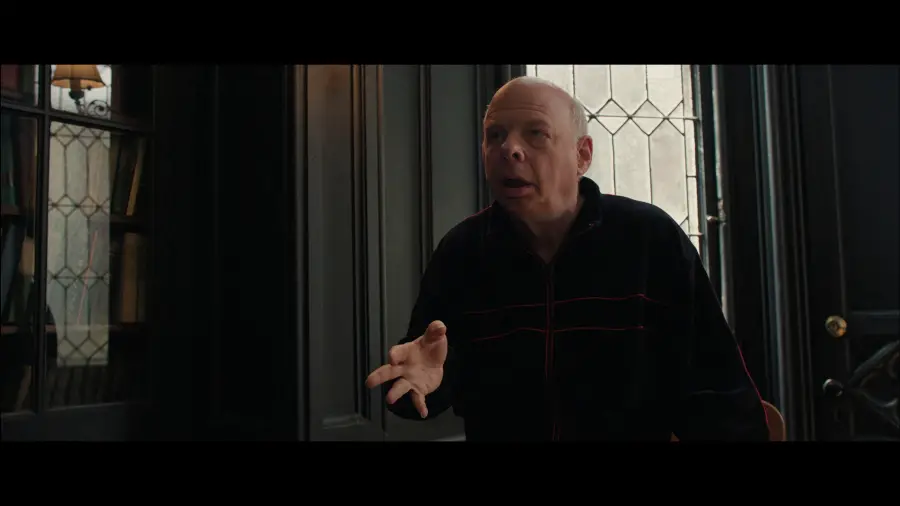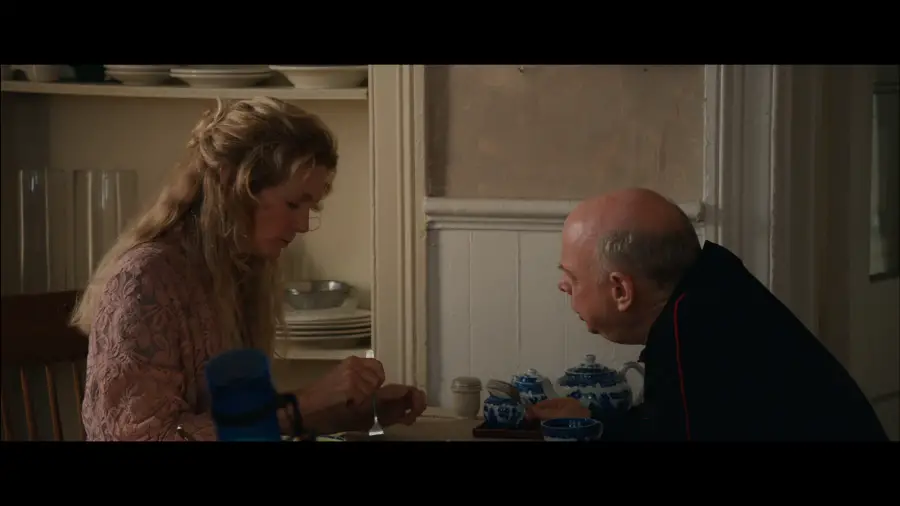A Master Builder

See more details, packaging, or compare
Synopsis
Twenty years after their brilliant cinema-theater experiment Vanya on 42nd Street, Wallace Shawn and André Gregory reunited to produce another idiosyncratic film version of a classic play, this time Henrik Ibsen’s Bygmester Solness (Master Builder Solness). Brought pristinely to the screen by Jonathan Demme, this compellingly abstract reimagining features Shawn (who also wrote the adaptation) as a visionary but tyrannical middle-aged architect haunted by figures from his past, most acutely an attractive, vivacious young woman (the breathtaking newcomer Lisa Joyce) who has appeared on his doorstep. Also featuring standout supporting performances by Julie Hagerty, Larry Pine, and Gregory, A Master Builder, like Vanya, is the result of many years of rehearsals, a living, breathing, constantly shifting work that unites theater, film, and dream.
Picture 8/10
Jonathan Demme’s A Master Builder (a filmed version of Andre Gregory’s and Wallace Shawn’s adaptation of Henrik Ibsen’s play The Master Builder) makes its home video debut through The Criterion Collection, who present it on Blu-ray with a 1080p/24hz high-definition image on a dual-layer disc. The film features multiple aspect ratios: the opening and ending are presented in 1.78:1, while the bulk of the film is presented in the ratio of around 2.35:1. The film was shot digitally and the presentation is ported directly from that.
The film was actually shot using two different digital cameras, accounting (somewhat) for the different aspect ratios and differing looks of the film. The opening and closing (as well as some flashes in the middle) were shot using a Sony XDCAM PMW-EX3 in 1920x1080, while the remainder of the film was shot using an Arri Alexa in 2K. The material shot with the Sony has a more “home video” kind of vibe to it, and is unfortunately laced with artifacts and issues. It looks as though the picture may be in a different frame rate other than 24hz, possibly 60hz, and this gives it an odd look. There’s some obvious trailing at times when objects move, and artifacts, like mosquito noise, are consistently there. Colours are also extremely muted, with pale flesh tones, while whites can be blown out and darker scenes are crushed. All of this obviously comes down to the equipment used and is inherent to the source: Criterion wouldn’t have been able to do much of anything to this. Still, I was so far unimpressed and was actually dreading them film, not knowing where it was going at this point (obviously), thinking it was going to be ugly just for the sake of it, with a mildly shaking the camera here and there, trying to capture some sort of “realism” or whatever, an effect I’ve admittedly grown quite tired of.
But then at a critical point (I’ll avoid spoilers) the film switches over to the Arri 2K camera, and do things drastically improve! What the film was going for becomes far more obvious here and I forgave the first little bit. From here until the last portion of the film the image is far, far smoother. All of the noise and artifacts from before are gone, colours are saturated beautifully, with more natural looking skin tones and some rich reds, with black levels that are stronger. Crushing becomes less of an issue, only noticeable in darker scenes, but this is usually a general weakness with digital photography. These darker scenes also present some digital noise, but it’s mild and not overly distracting.
The image becomes far more filmic (the camera is also a lot steadier in its movements), delivering an excellent amount of detail with clean edges. Textures also look rather natural and depth is decent. And, other than the noise I mentioned in darker scenes, artifacts aren’t an issue. The image looks so much cleaner and natural, and when there is movement there isn’t that distracting ghosting effect from earlier. The photography during this portion is quite gorgeous and its presentation here is superb.
So on the whole the image is mixed, but some of the issues present have to do with the limitations of shooting digitally and Demme’s stylistic choices—after getting over my initial disgust I guess it only makes sense, in the context of Shawn’s adaptation of Ibsen’s play, that the opening and closing have a more “real” home video look and the mid-section looks like a “movie.” I rather liked this aspect of the film and, warts and all, Criterion’s presentation delivers it exceptionally well.








































Audio 8/10
The film versions of Gregory’s and Shawn’s work before this film (both directed by Louis Malle) haven’t been overly dynamic in their audio presentations, but Demme gets a little more creative here, delivering the film with a fairly effective 5.1 surround track, presented in DTS-HD MA on this Blu-ray.
Audio is excellent on the whole, with dialogue sticking primarily to the center channel, presenting excellent fidelity and depth. Music also sounds crisp and clean, but it’s nicely delivered through the surrounds. It almost sounds like its floating around the viewer, giving an ethereal quality to it, which perfectly suits the film. In all it’s an effective track
Extras 6/10
Criterion has gathered a number of interviews together for this edition, providing a decent overview of the film, along with a retrospective of Shawn’s and Gregory’s work together, yet I couldn’t help but feel a little underwhelmed since it feels as though there could be so much more.
The supplements begin with The Ibsen Project, a 34-minute conversation between critic David Edelstein, Andre Gregory, Wallace Shawn, and director Jonathan Demme. Edelstein acts more as a moderator, asking questions, getting the conversation going, and both Shawn and Gregory answer them, talking about how the project began, 14 years ago, and how it developed over the years, from Shawn’s translation to getting a group of actors together. The group put on a number of performances for a low number of invited guests over the years, until Jonathan Demme finally saw it (the last performance apparently) and offered to make a film version. Demme sadly has very little to say here, giving the spotlight more to Gregory and Shawn, which makes sense as the project is their baby. But Demme does talk about the process of translating it to screen and also does go into some of the technical decisions, but again he sort of stays in the back. It’s a fascinating overview of the project though I guess maybe I was hoping for more from Demme about the film itself.
Following this is an interview with Lisa Joyce and Julie Haggerty, which is found under Hilde and Aline, the name of the two characters each respectively play. This is probably the more entertaining and fun of the supplements as the two talk about the long process of working on the project, the things they enjoyed, and even the things they’ll miss now that it’s all over. The two also talk about their characters and the development of them. Joyce interestingly points out how she had actually read for the part of Hilde for another production of the play, though didn’t really understand how to play her. It wasn’t until she read Shawn’s adaptation that she felt she got how to play the character. It’s a fun, very loose interview, but it’s packed with a great perspective on the project from that of the actors. Probably my favourite feature on here. It runs about 33-minutes.
Criterion then provides another interview with Wallace and Gregory, this time moderated by Fran Lebowitz. This 52-minute interview is the one that acts as the retrospective of their career, the two talking about first meeting, explaining their working relationship and what they were each, more or less, responsible for, and the various projects they’ve worked on. They explain why it takes so long for them to work on the projects (as mentioned here and elsewhere in supplements previously, A Master Builder was developed and performed over a period of 14 years) and then even talk a little about the film versions and what both directors Louis Malle and Demme brought to them. They even talk a bit about the theater, which none of the participants care about surprisingly (Gregory finds the theater boring and never goes, preferring films), and talk about how most “filmed plays” are basically worse than death. Though Gregory and Shawn are fairly easy going (particularly Gregory, who seems almost too laid back) I unfortunately found this interview fairly stuffy, which I blame more on Lebowitz and some of her questions. Some decent material in here, and I enjoy that the two are together here, but it may be my least favourite item here disappointingly.
The disc then closes with a theatrical trailer, and the insert includes an essay by Michael Sragow, who goes over Shawn’s adaptation and how Demme translates that translation to screen. It adds the only analytical element to the release, while also supplying more detail on the actual play and Henrik Ibsen.
I’m guessing Criterion wanted to focus the supplements more on Gregory and Shawn since this was their work and project primarily, but I’m still underwhelmed by the lack of more details from Demme, as well as the lack of information about Ibsen and his play.
Closing
In terms of presentation it’s a very nice release, presenting excellent video and audio. And though I appreciated all the information dealt out from the supplements about this rather fascinating project, I was still disappointed Demme wasn’t more involved in the supplements, along with the lack more scholarly material about the adaptation, the film, or the actual play.







